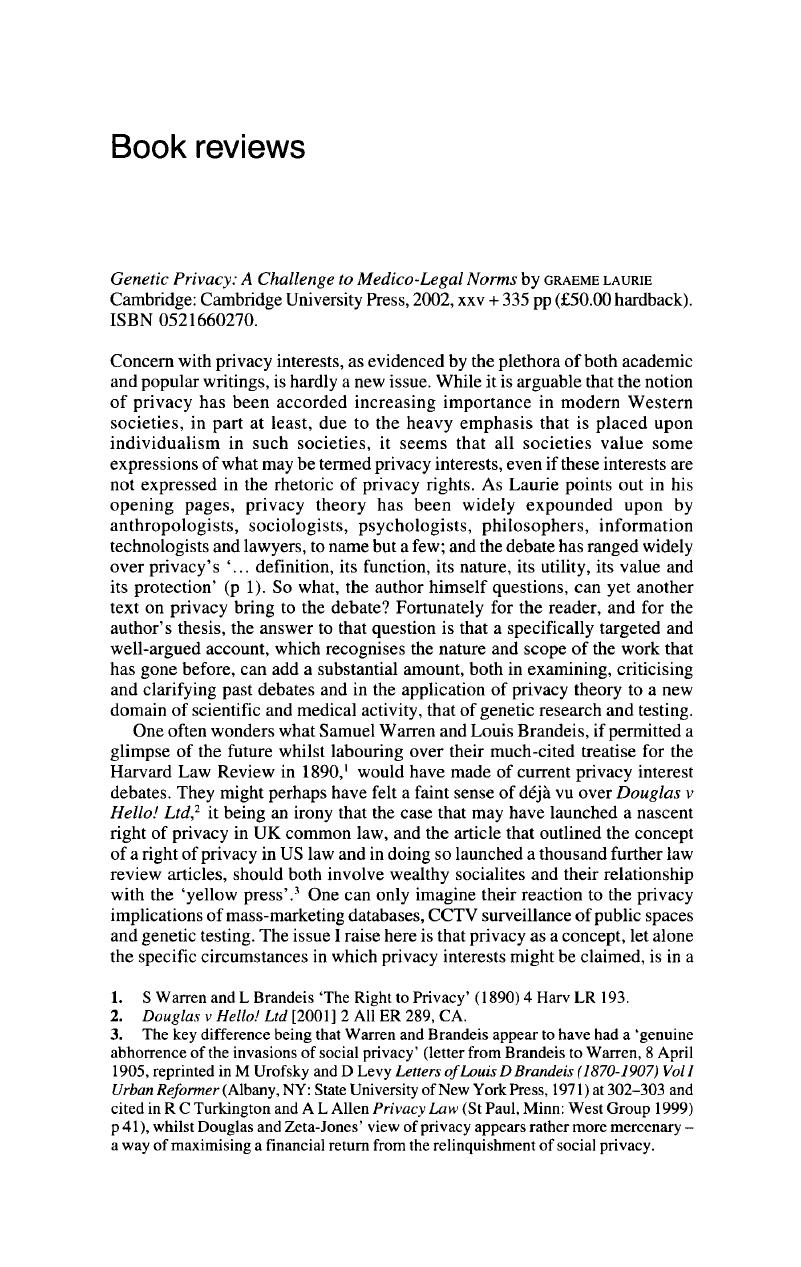No CrossRef data available.
Article contents
Genetic Privacy: A Challenge to Medico-Legal Norms by Graeme Laurie, Cambridge: Cambridge University Press, 2002, xxv + 335 pp (£50.00 hardback). ISBN 0521660270.
Published online by Cambridge University Press: 02 January 2018
Abstract

- Type
- Book Review
- Information
- Copyright
- Copyright © Society of Legal Scholars 2003
References
1 S Warren and L Brandeis ‘The Right to Privacy’ (1890) 4 Harv LR 193.
2 Douglas v Hello! Ltd [2001] 2 All ER 289, CA.
3 The key difference being that Warren and Brandeis appear to have had a ‘genuine abhorrence of the invasions of social privacy’ (letter from Brandeis to Warren, 8 April 1905, reprinted in M Urofsky and D Levy Letters of Louis D Brandeis (1870–1907) Voll Urban Reformer (Albany, NY: State University of New York Press, 1971) at 302–303 and cited in R C Turkington and A L Allen Privacy Law (St Paul, Minn: West Group 1999) p 41), whilst Douglas and Zeta-Jones' view of privacy appears rather more mercenary — a way of maximising a financial return from the relinquishment of social privacy.
4 Eg W Prosser ‘Privacy’ (1960) 48 Calif LR 383; E J Bloustein ‘Privacy as an Aspect of Human Dignity: An Answer to Dean Prosser’ (1964) 39 NYULR 962; H Gross ‘The Concept of Privacy’ (1967) 42 NYULR 34; C Fried ‘Privacy (A Moral Analysis)’ (1968) 77 Yale LJ 475; J J Thompson ‘The Right to Privacy’ (1974–75) 4 Philosophy and Public Affairs 295; R A Posner ‘The Right to Privacy’ (1978) 12 Ga LR 393.
5 C Calvert Voyeur Nation: Media, Privacy, and Peering in Modem Culture (Boulder Colorada: Westview Press, 2000).
6 And, more recently, a game show on BBC3 called CCTV, which appears to be entirely premised around people caught on CCTV camera whilst going about their everyday lives.
7 See eg the review of this text by Philip Leith in the online Journal of Law and Information Technology at http/www/elj.warwick.ac.uk/jilt/02-2/leith.html. Leith, as a self-professed privacy sceptic, is unconvinced by Laurie's use of concepts of information privacy (information about the person) and spatial privacy (a zone of privateness surrounding the individual that cannot and should not be invaded without due cause), feeling that the latter, in particular, ‘appears to make recourse to some mystical element of the individual’— a charge that could perhaps be levelled at a number of human rights. Despite that objection, it seems, in fact, that Leith's scepticism lies less with Laurie's account of privacy interests than in the fact that privacy rhetoric in law all too often fails to translate to privacy interest protection, with ‘privacy’ laws instead becoming mechanisms for validating the commodification of data (the Data Protection Act 1998), or for justifying the overriding of privacy interests in the ‘public interest’ (again, the 1998 Act). To my mind, this does not invalidate Laurie's privacy interest premise, although it may make us question whether we can realistically expect that premise to see much practical use in the commercial sphere, in the light of the lobbying to ensure that privacy laws are not ‘too onerous’. In terms of protecting narrower genetic privacy interests, such as those between family members, such scepticism may not be entirely justified in that Laurie's account may be valuable in providing a basis, if not for formal regulation, then for the practices of medical practitioners and researchers.
8 N Dixon’ Cancer scare hits gene cures' (2002) 176 New Scientist 2364, 12 October, at 4.
9 Brin, D The Transparent Society (New York: Perseus Press, 1998 Google Scholar).
10 See eg Packard, V The Naked Society (London: Longman, 1964 Google Scholar); Long, E V The Intruders: The Invasion of Privacy by Government and Industry (New York: Praeger, 1967 Google Scholar); A R Miller The Assault on Privacy: Computers, Data Banks and Dossiers (Ann Arbor: University of Michigan Press, 1971); A Neier Dossier: The Secret Files They Keep on You (New York: Stein & Day, 1975).


